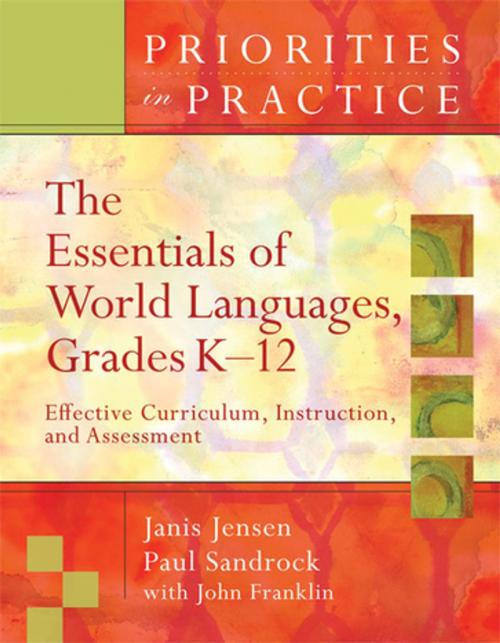The Essentials of World Languages, Grades K-12
Effective Curriculum, Instruction, and Assessment (Priorities in Practice)
Nonfiction, Reference & Language, Education & Teaching, Teaching, Computers & Technology| Author: | Janis Jensen, Paul Sandrock, John Franklin | ISBN: | 9781416616993 |
| Publisher: | ASCD | Publication: | September 15, 2007 |
| Imprint: | ASCD | Language: | English |
| Author: | Janis Jensen, Paul Sandrock, John Franklin |
| ISBN: | 9781416616993 |
| Publisher: | ASCD |
| Publication: | September 15, 2007 |
| Imprint: | ASCD |
| Language: | English |
We live in a global community, and to be a full member of this community often requires speaking more than one language. Educators and policymakers must ask themselves: What does it mean to view language learning not as an elective but as a necessity for communicating and interacting with people around the world? The Essentials of World Languages, Grades K–12 answers this question and many more as it shows us * Why world languages must be positioned as an essential part of a balanced curriculum and why the time is right for implementing change. * When language instruction should begin and how language instruction should be delivered and assessed. * How to redefine the role of the teacher and curriculum coordinator in language learning. * How to set realistic expectations for students’ second-language proficiency. * How to design curriculum using assessment targets. Packed with information about major trends and issues in world language education, this book offers valuable curriculum resources to help educators design and implement flexible language programs that prepare children to live and work in an interconnected, global culture.
We live in a global community, and to be a full member of this community often requires speaking more than one language. Educators and policymakers must ask themselves: What does it mean to view language learning not as an elective but as a necessity for communicating and interacting with people around the world? The Essentials of World Languages, Grades K–12 answers this question and many more as it shows us * Why world languages must be positioned as an essential part of a balanced curriculum and why the time is right for implementing change. * When language instruction should begin and how language instruction should be delivered and assessed. * How to redefine the role of the teacher and curriculum coordinator in language learning. * How to set realistic expectations for students’ second-language proficiency. * How to design curriculum using assessment targets. Packed with information about major trends and issues in world language education, this book offers valuable curriculum resources to help educators design and implement flexible language programs that prepare children to live and work in an interconnected, global culture.















